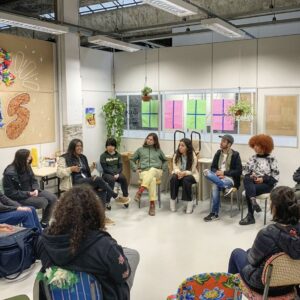Interaction design, like theater, depends on the performances of human actors to realize its aesthetic expression. Interaction designers create software code much like theater scripts, while users often ignore them and improvise. Drawing from the analogy of Computer as Theater proposed by Brenda Laurel and the Theater of the Oppressed developed by Augusto Boal, this method mixes embodied practices of designing and acting to criticize oppressive interactions and create liberating interactions mediated by computer technology.

The analogy between theater and digital technology reveals the invisible social implications of acting with technology and its ethical dimension. Ethics is often neglected in technology development, mainly due to the influence of the solutionist ideology that equates technology with absolute goodness and relative neutrality. As for theater, ethics is at the core of the play. Theater raises ethical questions through aesthetical expression, which technology does as well, yet in a low profile. The solutionist ideology, for example, expresses its neutrality and goodness through minimalist, flat, and clean Graphic User Interfaces. Behind this ideology lies the less obvious yet more profound ethics of interaction aesthetics or the procedural time-based structures that steer people to certain human-human interactions.

An Interaction Design Theater session can be documented using an oppression reaction flowchart for further analysis of the space of possibilities and improvised videos. With them, students grasped the essential historicity quality to speculate relevant designs to their context.Historically, the Interaction Design Theater at PUCPR (2015-2018) served as the foundational laboratory for the Theater of the Techno-Oppressed at UTFPR (2019-2023).

References
Rodrigo Freese Gonzatto and Frederick M. C. van Amstel. 2017. Designing oppressive and libertarian interactions with the conscious body. In Proceedings of the XVI Brazilian Symposium on Human Factors in Computing Systems(IHC 2017). ACM, New York, NY, USA, Article 22, 10 pages. DOI: https://doi.org/10.1145/3160504.3160542
Van Amstel, Frederick M.C and Gonzatto, Rodrigo Freese. (2020) The Anthropophagic Studio: Towards a Critical Pedagogy for Interaction Design. Digital Creativity, 31(4), p. 259-283. DOI: https://doi.org/10.1080/14626268.2020.1802295
Van Amstel, Frederick M. C. and Gonzatto, Rodrigo Freese. (2022). Existential time and historicity in interaction design. Human-Computer Interaction, 37(1), pp.29-68. DOI: https://doi.org/10.1080/07370024.2021.1912607

